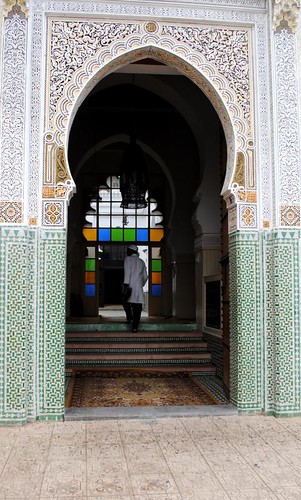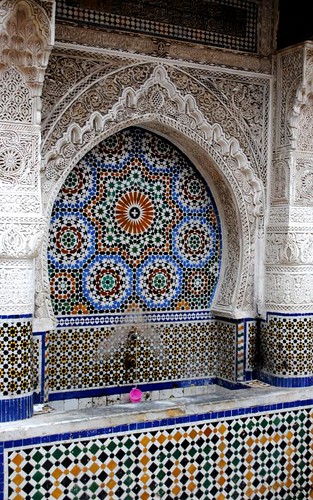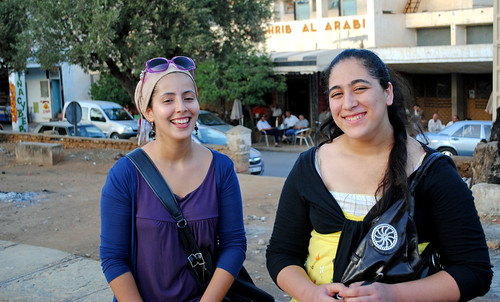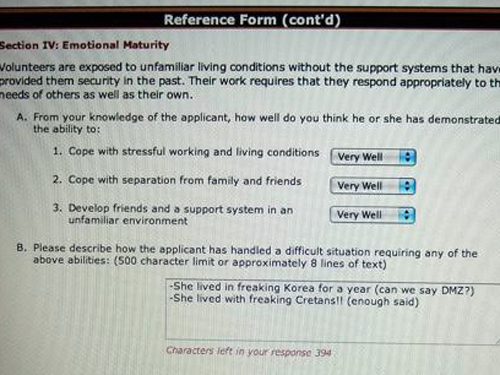It’s been a busy month, and one unlike anything I’ve ever experienced. The first week was spent in Fes, which only barely felt like living in Morocco. I was surrounded by Americans, the Moroccan staff all spoke excellent English and I rarely left the training center for more than a quick run to a hanut, the small convenience stores that abound on every street corner.
Then, after week, we moved to our CBT sites, which was a jarringly different experience and I was suddenly living by myself with a Moroccan family who spoke little English (at a time when my Darija was pretty much limited to telling people my name, where I was from and my marital status). My stomach was in knots all morning the day we left for CBT, and I had to make a fist to keep my hands from shaking as I entered my home for the next two months. That evening, I was sitting alone on the couch of my new home, nervous, clueless about how to start a conversation and dreading the long evening in front of me. Then Soukayna, my 17-year-old host sister, drug me over to the family computer so she could show me her Facebook page and took me outside, where I met the neighbors and we sat on the steps and listened to Barbie Girl on Soukayna’s phone. During dinner, Simo, my 11-year-old brother, made sure to find an American movie (Twister) subtitled in Arabic to watch, so that I would be included. All evening, my host family went out of their way to made sure I felt included and welcomed. I had anticipated a long and lonely evening, but instead went to bed feeling hopeful and optimistic about the next two months.
For the most part, living with a host family has been a positive experience. As my Darija abilities have developed, I’ve been able to start to actually talk with them, and one of my favorite times of the day is sitting around the dinner at table and trying to chat with my host mom and sisters. My host sisters and I have jokes, and my host brother and I play computer games and soccer together. They always introduce me as their sister, and last night, I told Simo I had three brothers. One was 23, one was 20 and one was 11.
“I’m 11!” he told me.
“I know,” I told him. “You’re my 11 year old brother.”
They’ve also been helpful when I’m studying. Ranya, my 13-year-old host sister, sits with me in the afternoon and helps me review my vocab flashcards and corrects my pronunciation. My host mom in particular is good at correcting me when I talk when her, but not correcting me beyond what I’m suppose to know. We learned present tense last week, and as soon as I started using it in conversation, she started correcting my mistakes, but last week when all I knew was the past tense and would attach deba (now) to any statement I wanted to be in present tense, she let it slide.
Not that living with a host family is always perfect. I miss the privacy and autonomy I had when I was living at home. My host mother decides everything, from when we eat dinner (answer: always later than I want, the latest has been 11:30) to when I can take a shower. While in theory I have my own room (a Peace Corp requirement), my host siblings are constantly in and out, the door I make sure to shut when I leave is always open when I return and after the first week, I realized that when people visit the house, my host mother immediately takes then to see my room.
I spend most of my day at school. I leave the house at 8:00 in the morning, and if I’m lucky, I’m home by 6:00. We study language all morning, and it’s amazing how fast I’m progressing. A month ago, I didn’t know a word of Moroccan, and now I have conversations. I’m comfortable, if not always adept, talking to shopkeepers and the neighbors, and yesterday I had my first program at the local dar chebab entirely in Darija, and it didn’t end in tears or fire or confusion. (Granted, I did write out the directions ahead of time and read from my notebook, but I also answered questions and talked with the kids and understood at least a large percentage of what was said, so I call it a success.) We’ve learned the entire Arabic alphabet, and I can slowly sound out street signs and write out simple notes.
I’m busier than I’ve ever been. In addition to being at school for ten hours a day, I have homework, grammar to study and vocabulary to learn, and when I’m not studying, I’m spending time with my host family, which is it’s own form of studying. There’s a stack of Peace Corp books on procedure and methods that I’m suppose to read before I swear in sitting on my desk, and every few weeks, I have reports on my progress to turn in. I live in a constant state of being behind on blogging and uploading photos and all my grand ideas of visiting other CBT sites during my one day off a week have gone out the window. I’m starting to feel a little frayed around the edges, but everyone I’ve talked to says that the pace slows down once you get to your site, and I can last another month.
Last Monday was National Woman’s Day, and the Peace Corps provided us with You Can Dream: Stories of Moroccan Women Who Do, a documentary about female leadership in Morocco, and one of the women featured lives in my town. Ten years ago, a Peace Corps volunteer had the idea of turning l3qad, the buttons from jellabas, a traditional Moroccan dress, into beads and using them to make jewelry. They applied for a loan and started a local artisans co-op for hand-made crafts. A decade later, the l3qad buttons and the co-op are still around. My host mother runs a shop at the co-op and sells jellabasand other traditional outfits. l3qad jewelry are now sold around Morocco and the women in my neighborhood sit on the front stoop and make beads while they gossip and watch their children play. I’m inherently skeptical of how much of a lasting impact I can make in only two years, but this co-op and the industry has made a real impact in the lives of the women here. Watching the video made me think that I have a chance of also making a real impact on my community, and reminded me of why I applied to the Peace Corps in the first place.



(Top Left: Entrance to a mosque near the Medina Fes-el-Bali (Old Medina); Top Right: Beautiful saqiya, public water fountain, in the Fes medina. Saqiya are all over the medina, and are still in use; Bottom: (from l to r) Fatima(my teacher) and Soukayna (my oldest host-sister)

